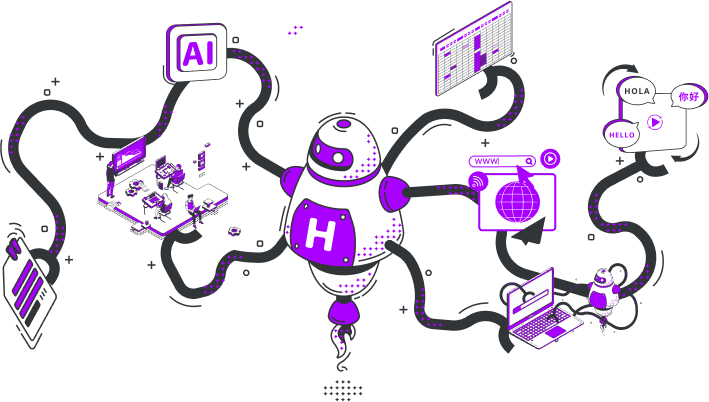Market research serves as a fundamental pillar for maintaining competitiveness and achieving success in your business. Whether you’re launching a new product or improving the existing one, you should always stay updated with the latest market data.
Traditional methods like surveys, interviews, and focus groups have long been relied upon for gathering market data. However, a powerful addition to these established methodologies has emerged in the form of web scraping. By automating data collection from websites, web scraping enables businesses to acquire market data at an unprecedented scale and speed, revolutionizing the landscape of market research.
In this article, we delve into the ways web scraping can enhance market research and examine how tools like Hexomatic can provide a strategic advantage, equipping businesses with the means to thrive in today’s competitive markets.
What is market research, and why is it important?
Market research helps anyone to get information about their market and business landscape. It can also show how a certain company is perceived by the target audience. By conducting market research, you will find out how to connect with your potential clients and how to stay competitive in the market you chose.
Market research can also play an important role in the process of developing your products or services.
Below we explore how market research can help you improve your business strategy:
Gaining business insights: With the help of market research, you can find out how your business is perceived by your potential customers and competitors.
Customer identification: Market research enables you to pinpoint the demographics and geographic locations of your customer base. It identifies the customer segments that are more likely to engage with your business.
Discovering new ideas: If you are looking for a new business concept or product, you can carry out market research and find out what kind of product or service is demanded in a specific market. This data will allow you to focus on a business idea that has more chances to be successful.
Informed decision-making: Market research guides strategic choices, including product packaging, promotional endeavors, and crafting compelling marketing messages. Market data will help you make decisions that resonate with your target audience.
Market research automation ideas
Nowadays, there are so many automation tools that you can use to carry out web scraping for market research. By automating market research processes, you can collect data faster, without wasting your time and resources on manual data collection tasks.
Moreover, market research automation tools will allow you to collect data that is free from human-generated errors, thereby enhancing data accuracy and reliability.
Below we will show you a few helpful market research automation ideas you can use to gather the required data in no time!
Google search automation: Automate the data collection
This automation is great for gathering Google search results and discovering your competitors in the market.
You can use Google search automation to collect competitor data and analyze the search results to understand how your competitors position themselves and how you can stay competitive in the market.
Besides, Google search data can inspire content ideas for your blog, social media, or website. Addressing popular search queries in your content can attract more organic traffic.
For instance, if you own a real estate agency in the US and need to find out current market trends and identify your competitors, you can search for the relevant keyword such as “Real estate agency in LA”, then choose the country and how many websites you want the automation to scrape for you.
After running the automation, you will have a complete list of real estate agencies in LA with website URLs, titles, cache URLs, descriptions, and search types (organic or paid). Export the information to a Google Sheet and enjoy the results!
Google Maps: Perform Google Maps searches and get SERP results
You can use Google Maps automation for various marketing purposes. First of all, you can scrape Google Maps reviews about your main competitors, which will help you build a better marketing and sales strategy.
You can also scrape and analyze your own company data to check customer satisfaction. By scraping all reviews of your company from Google Maps, you can analyze the gathered data to find the overall level of satisfaction with your company.
This automation will scrape data fields, such as titles, website URLs, business addresses, ratings, phone numbers, categories, the latitude and longitude of buildings, etc.
Trustpilot search: Get data on businesses listed on Trustpilot, including reviews and company details
Using Trustpilot data for marketing involves gathering and analyzing customer reviews to discover customer satisfaction levels. By analyzing this data, you can find out what customers expect from you, their pain points, and ways to solve their problems.
The data will show you competitors’ successful practices, which you can use to improve your own strategies and stay ahead in the market.
It’s super easy to use this automation. All you have to do is type the relevant keyword in the Trustpilot search automation and you’ll get the list of businesses and detailed information, such as Trustpilot search reviews count, ratings, Trsupilor URLs, and more.
Tripadvisor search: Get data on Tripadvisor listings
Tripadvisor is a great source of leads or competitive data. You can search for any kind of business with the help of our automation, and scrape company data in a few seconds. This information can be used to develop new services for your business.
For instance, if you are in the hospitality industry, you can search for hotels in a specific location and get data that includes Tripadvisor ranking, hotel names, Tripadvisor URLs, number of reviews, and ratings.
Google BigQuery: Discover and access unique and valuable datasets from Google, public, or commercial providers
BigQuery is a fully-managed, serverless data warehouse and analytics platform developed by Google Cloud. It allows organizations to store, analyze, and query massive amounts of data quickly and efficiently. BigQuery is designed to handle “big data” and enables users to run complex SQL-like queries on large datasets without the need to manage infrastructure or worry about scalability.
With Hexomatic’s Google BigQuery automation, anyone can access over 230 public datasets, including Google Trends, the US Census, blockchains, and many more.
Due to its capabilities in handling and analyzing large volumes of data, you can carry out market research to identify market trends, analyze competitors, customer feedback, and many more.
Scraping recipes: your own bots for scraping data from any website
Do you need to collect data from multiple product pages and don’t want to waste your time visiting each product page and copy-pasting the existing information into a separate Google Sheet? Here’s where Hexomatic’s scraping recipes will come in handy. The latter enables you to create your own bots to scrape data from any website via a point-and-click browser.
By creating a scraping recipe for a single web page, you can gather data from all the pages that share the same HTML template.
Here’s how it works:
To begin, navigate to a specific product or single listing page using your web browser, then copy the URL.
Go to Hexomatic and click on the “New” button to create a scraping recipe from blank or by using a template.
Hexomatic has created various scraping recipes for you to save you time. The scraping recipes include eBay product listings, Appsumo product pages, Asos, Indeed, Product Hunt, Alibaba, Jomashop, Shein, Costco, GitHub, Quora, and many other useful websites.
If you don’t find the scraping recipe for the website you want to scrape, you can create your own recipe by choosing the “blank” option. Then, use the URL you captured and click preview.
After, click on each of the elements you want to capture, choosing the “Select Single” or “Select all” option each time based on your requirements. For example, you could capture the product name, image, description, price, etc.
Assign labels to each field you’re extracting, and then specify your preference for capturing text, numbers, source URLs, phone numbers, email addresses, etc. Then, save the recipe and start using it in the workflows to scrape any webpage you want!
We’ve presented a selection of market research automation to help you enhance your workflow and maintain a competitive edge. Delve into our library featuring 100+ automation solutions, choosing the ones that perfectly match your requirements. Remember, adopting web scraping for market research can significantly facilitate the realization of your business objectives.
Automate & scale time-consuming tasks like never before


Content Writer | Marketing Specialist
Experienced in writing SaaS and marketing content, helps customers to easily perform web scrapings, automate time-consuming tasks and be informed about latest tech trends with step-by-step tutorials and insider articles.
Follow me on Linkedin
